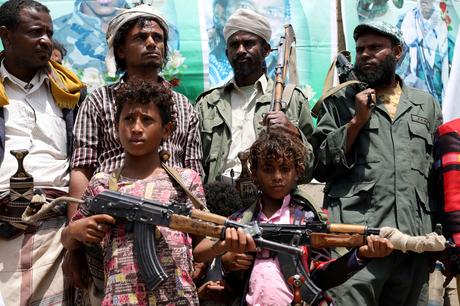
(Riyadh) The separatists in southern Yemen announced on Wednesday that they were relinquishing their autonomy and pledged to implement a power-sharing agreement with the government, raising hopes of reconciliation between these two camps allies against the Houthi rebels.
Posted on 29 July 2020 at 8 o'clock22 Updated at 08 h 25
France Media Agency
The main conflict in Yemen has since 2014 opposed the government, supported by a military coalition led by Saudi Arabia, to the Houthis, supported by the Iran. And the deadly fighting that subsequently erupted between the government and the Southern Transitional Council (STC) separatists was a war within a war.
A so-called “Riyadh” agreement was signed in November 2019 and provides for a sharing of power in the south between government and separatists. But its provisions were hardly put in place and quickly became obsolete.
On Wednesday, the STC nevertheless announced that it “renounced its declaration of autonomy” proclaimed last April, in order to allow the application of the Riyadh agreement, wrote on Twitter the spokesperson of the STC, Nizar Haitham, on the role played by Saudi Arabia and the United Arab Emirates in reaching this decision.
Saudi Arabia has confirmed that it has proposed a plan to “speed up” the implementation of the agreement, according to the official Saudi agency SPA.
This plan provides for the Yemeni prime minister to form a new government within 29 days, as well as the appointment of a new governor in Aden (south), the provisional capital of Yemen, where the separatists are based.
“Once (the plan) is implemented, the government should start its work in Aden and oversee the implementation of the Riyadh Accord,” SPA said.
” Not important ”
The Yemeni government of President Abd Rabbo Mansour Hadi welcomed the announcement, its spokesman, Rajeh Badi, expressing the hope of a “serious start” for the implementation of the Riyadh agreement.
The Saudi Minister of Foreign Affairs, Prince Faisal ben Farhan, saw it as “a positive step”. And Saudi Deputy Defense Minister Prince Khaled bin Salman praised the “will for dialogue” to “resolve differences, without resorting to force.”
The UN envoy for Yemen, Martin Griffiths, hailed an “important step” towards a peaceful solution to the conflict.
Mr. Hadi, who lives in exile in the Saudi capital Riyadh, immediately announced the appointment of a new police commander and a new governor in Aden.
At the end of June, the Riyadh-led coalition deployed Saudi observers to monitor a ceasefire decreed between pro-government forces, which it supports, and separatist fighters, after clashes in the South.
Mr. Hadi then urged the separatists to “end the bloodshed” and respect the power-sharing agreement.
“No wages”
If it holds, this reconciliation should allow the Riyadh-led coalition to focus on the war against the Houthis.
“Currently, without a united response, the Saudis, the Yemeni government and the STC are on the defensive (…) because the Houthis are attacking their regions with complete impunity”, Fatima Abo Alasrar of the Middle told AFP. East Institute.
The conflict between the government and the separatists has made even more complex a war which, in five years, has left tens of thousands of deaths and caused, according to the UN, the worst humanitarian crisis in the world in the world .
Acute food insecurity is expected to increase sharply in southern Yemen, the poorest country in the Arabian Peninsula, due to a combination of factors exacerbated by the COVID pandemic – 19, according to a report from several UN agencies.
“We hope that the government that will be formed will deal with the South in general and Aden in particular. In Aden, services are poor and most residents have not received their salaries for four or five months, ”said Ahmad Al-Zahrani, a resident of Aden.

